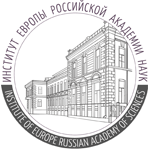institute of europe
the institute of europe of the russian academy of sciences
New world order: opportunities and risks
- 20 February 2017
On February 20, 2017, Alexander Kamkin, leading scientific associate of IE RAS Center for German Studies, took part in «Pravo Golosa» program (Channel TV-Centre) on the topic «New world order: opportunities and risks», dedicated to Munich Security Conference, which took place on February 17-19, 2017.
The participants covered a wide spectrum of topics associated with EU-US-Russia triangle, such as the upcoming parliamentary election in Germany and the effect of Trump coming to power in the US. The program’s mediator highlighted the importance of the current period in Russian foreign policy: Moscow no longer allows the West to treat it as a subordinate.
A number of participants pointed out that competitive military sector is a vital element in building Russia's resilience with regard to new threats. Simultaneously, they remarked that the West refuses to enter in a productive dialogue with Russia on key issues of global security. Their opponents claimed that budget spending in Russia should be corrected in favor of social welfare, as enhanced workforce productivity is a chance of filling up the future budget and raising the country's resilience to shocks. The discussion about world security gradually transformed itself into the talk about Russia's destiny.
Alexander Kamkin expressed the idea that Germany's commitment to its Transatlantic ties would remain intact regardless of the outcome of parliamentary election and future federal Chancellor's personality. He also said that German officials have always tended to block the progress of German-Russian relations by claiming that they cannot sacrifice solid ties with Washington for the sake of establishing direct dialogue between Berlin and Moscow.
The future of common European army was another significant topic. Most of the participants treated the idea with high degree of skepticism, whereas Alexander Kamkin remarked that this target was anchored in the Treaty of Lisbon, meaning that common European army would be another step towards the «United States of Europe». The creation of common European army and police is a question of 10-15 years, despite the fact that the EU is already represented in the WTO as a single entity.
The participants came to the consensus that the world is becoming more complex, as the keys to global security are now at the disposal of various actors. Constant dialogue among these actors is crucial for preserving global peace.
http://www.tvc.ru/channel/brand/id/36/show/episodes/episode_id/48602/
http://www.tvc.ru/channel/brand/id/36/show/episodes/episode_id/48602/

